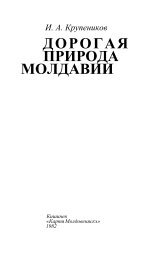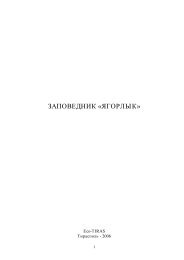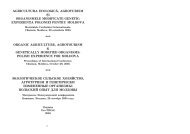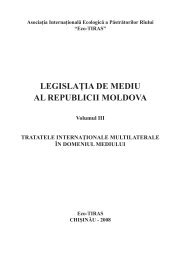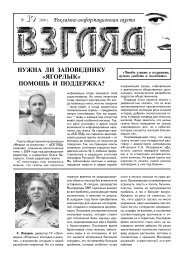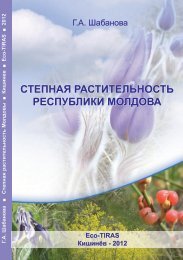THE IMPORTANCE OF PUBLIC PARTICIPATION AS STIPULATEDBY THE PROTOCOL ON WATER AND HEALTH FOR THE IMPLEMENTATIONOF THE HUMAN RIGHT TO WATER AND SANITATIONAnke StockWomen of Europe for Common Future (WECF), Germany. E-mail: anke.stock@wecf.euThis paper focuses on the importance of public participation as determined in the Protocol on Water and Health (hereafter referred to as the“Protocol”) in particular for the realisation of the human right to water and sanitation.BACKGROUNDIn July 2010 the United Nations General Assembly 1recognised the human right to water and sanitation.However, according to statistics of 2006 by the WorldHealth Organization (WHO) still nearly 140 million people(16%) in the Eastern Europe, Caucasus and Central Asia(EECCA) region do not have a household connection to adrinking water supply, over 41 million people (5%) do nothave access to a save drinking water supply and 85 millionpeople (10%) do not have improved sanitation. This leadsto the consequence that many people live with unsafesanitation and water sources resulting in morbidity andmortality. Unsafe water sources also cause a large numberof outbreaks of other water-related epidemics, such ashepatitis A, typhoid fever, dysentery, and cholera.This shows that the establishment of a formal humanright to water and sanitation is important, but needs properimplementation. The UNECE/WHO-EURO Protocol onWater and Health is one tool on the way to implement theright in the UNECE region.The Protocol entered into force in 2005 and hascurrently 24 Parties 2 . The Protocol is the first internationallegally binding treaty designed to ensure, by linking watermanagement and health issues, the adequate supply ofsafe drinking water and adequate sanitation for all. Eventhough the Protocol is still young it helps to decreaseimportant disease burden that people in the pan-Europeanregion have to face.The Protocol puts great emphasis on access to informationand public participation. It recognises public involvementas a vital prerequisite for successful implementationof its provisions and thus the human right to waterand sanitation. Both elements: “Access to information andpublic participation in decision-making concerning waterand health are needed, inter alia, in order to enhance thequality and the implementation of the decisions, to buildpublic awareness of issues, to give the public the opportunityto express its concerns and to enable public authoritiesto take due account of such concerns” (Article5(i)). The Protocol also underlines that as a counterpartto their rights and entitlements natural and legal personsand institutions, whether of the public sector or the privatesector – thus including NGOs and the public – shouldcontribute to the protection of the water environment andthe conservation of water resources (Article 5 (m)).PUBLIC PARTICIPATIONThe Rio Declaration 3 of 1992 stated in Principle10 that “environmental issues are best handled withparticipation of all concerned citizens, at the relevantlevel.” Thus access to information and public participationare conditional for the enjoyment of the right to a healthyenvironment, including the right to water and sanitation.The principle of public participation holds that thosewho are or feel affected by a decision have a right to beinvolved in the decision-making process. Since then theprinciple has developed and found its base in the AarhusConvention 4 of 1998 which, inter alia, provided operationalcriteria for public participation.Public participation helps creating a climate of trustand builds bridges between the state and its citizens,fosters lively democracy, decisions are citizens-orientedand need-based, the process itself is more transparent andresults are backed by the population, thus implementationbecomes easier and greater accountability can beachieved (see also Article 5(i)).Different obligations and opportunities derive from theProtocol for different levels and phases of involvement forthe Parties and other stakeholders, such as the privateand voluntary sector. The scope goes from creating a“legal, administrative and economic framework… [for]contribution” (Article 4(5)) via the making available ofinformation to the public relevant to the implementationof this Protocol (see Article 10) to making “appropriatepractical and/or other provisions for public participation,within a transparent and fair framework, and … [ensuring]that due account is taken of the outcome of the publicparticipation” (Article 6(2)).Parties and Civil SocietyParties committed themselves under the Protocol tothe setting of targets and its revision. When doing so they“shall make appropriate practical and/or other provisionsfor public participation, within a transparent and fairframework, and shall ensure that due account is takenof the outcome of the public participation” (Article 6(2)).According to Article 6(5)(a) Parties shall also establishnational or local arrangements for coordination betweentheir competent authorities in order to set targets.Civil society (including NGOs) has the right to participatein the target setting process and its revision (see Article6). Furthermore, the Protocol reminds stakeholders fromcivil society of the corresponding obligations that go handin hand with the right to water and sanitation: “their moralobligations to contribute to the protection of the waterenvironment and the conservation of water resources”(Article 9(1)(b)). Members of the public also have the rightto make communications to the Compliance Committeeon cases of alleged non-compliance with the Protocol,1 UN GA Resolution 64/292 of 28 July 2010.2 List of ratification see at http://treaties.un.org/Pages/ViewDetails.aspx?src=TREATY&mtdsg_no=XXVII-5-a&chapter=27&lang=en.3 UNEP, Rio Declaration on Environment and Development, 1991, see at http://www.unep.org/Documents.Multilingual/Default.asp?documentid=78&articleid=1163.4 UNECE, Aarhus Convention on Access to Information, Public Participation in Decision-making and Access to Justice in Environmental Matters, 1998,see at http://www.unece.org/env/pp/treatytext.htm.— 2<strong>13</strong> —
which the Committee is then required to deal with (seeArticle 15). Ideally the Committee manages to facilitateand assist Parties in resolving existing problems.Principles of Public ParticipationUnder the Protocol Article 10 refers mainly to theprinciple of access to information and Article 6 to theprinciple of public participation. Article 6 requires a“transparent and fair framework” for public participationand Article 10 requires that access to information shallbe provided “within a reasonable time, free of chargeand within reasonable facilities to obtain copies of suchinformation upon payment of reasonable charges”. Thisreflects a set of key principles relating to public participationand access to information. Some of these principles applyto both approaches, others specifically refer to one or theother. Common key principles are:• Equity: offering stakeholders equal opportunities/access and equal scope for influence; applying principlesof gender, regional, ethnic and other balance;• Accountability and transparency: employingtransparent and democratic mechanisms; publishingresults to non-stakeholders in an understandable andtraceable way;• Flexibility: keeping the approach flexible by takinginto account differing issues, participants, linkages intodecision-making and time frames;• Effectiveness: being flexible does not exclude beingeffective; this means organising the process to sucha degree that competences, roles and time frames aredefined to a certain degree in order to provide clarity toall stakeholders;• Speed: informing timely all stakeholders; settingrealistic time frames and providing for necessary expertinput to allow for adequate proceedings within theprocess.Tools of Public ParticipationDecisions are taken at different levels (international,national, federal, provincial and local) and thereforerequire different tools. Even within one level differentdesigns of the process are possible, as there is not onemethod that fits all processes.Furthermore, there are different phases within eachdecision-making process: the information phase, theconsultation phase and the cooperation phase. Someprocesses lack the cooperation phase and are thus lessparticipatory in the real sense.In order to find the best tools for each individualdecision-making process it is important to be clear aboutdifferent criteria of the issues that need to be decidedupon. Not each method fits all purposes. Thus a properanalysis and a management plan (including a budget)as well as a time schedule have to be prepared inadvance.Some relevant tools are:• Referenda;• Public hearings/inquiries;• Public opinion surveys;• Citizens’ jury;• Focus groups;• Expert panels (e.g. river basin commissions);• Interviews;• Group model building;• Workshops;• Listserves and E-mails;• Media.THE RIGHT TO WATER AND SANITATIONGeneral Comment No. 15 (2002) 5 to the InternationalCovenant on <strong>Eco</strong>nomic, Social and Cultural Rights of 1966aims at protecting human health by securing the human rightto water. Article 2 of the General Comment sets out specificcriteria that define the right precisely: “the human right towater entitles everyone to sufficient, safe (quality), acceptable,physically accessible and affordable water for personaland domestic uses.” The Guidelines on the “Realizationof the Right to Drinking Water and Sanitation” 6 of 2005 usethese criteria for the right to sanitation respectively.These two documents still serve as a basis for definingthe content and the scope of the human right to water andsanitation. The Independent Expert on Water and Sanitation 7further developed these criteria: 5 of which are normativecriteria (availability, accessibility, quality/safety, affordability,acceptability), and 5 are cross-cutting ones (non-discrimination,participation, accountability, impact, sustainability).In international law the interpretation of these criteriais still quite wide and open and varies which is reflectedin the brief overview below. However, when lookingat the cross-cutting criteria it becomes obvious thatthey all require proper public participation. Without theinformation, the inclusion and participation of the publicthe cross-cutting criteria can not be met.Normative CriteriaFirst, the right is characterised by availability, i.e. oneshould have access to a sufficient amount of water (minimum7.5 litres per capita per day) 8 . Furthermore, a sufficientnumber of sanitation facilities should be available.The second and the third criteria are safety/qualityand acceptability. Water and sanitation should be safe, i.e.there should be no threat to human health. This criterionis meant as safeguard to protect the population from theconsumption of polluted water or from insanitary facilities.The acceptability implies that water should be acceptablein terms of colour and odour and that sanitation facilitiesare culturally and socially acceptable. 9The physical accessibility is one of the core concepts.In some cases in the EECCA region, water sources areremote in more than one kilometre from the house, whichleads to unsafe water storage practices. Additionally, peoplehave to walk long ways to reach the source. This criterioncalls for a water source that can be reached withinless than 30 minutes of walk and closer than 1 kilometre.This is important, in particular for women, as they facedangers for their life on a long way from home. For sanitationfacilities this criterion has to be interpreted evenstricter. They have to be accessible easily day and night,ideally they should be within the home. In particular forwomen, the risk should be minimal when using the toilet.Finally, water and sanitation facilities must beaffordable for everyone. This requires that water andother related services as well as the use of sanitationfacilities should match the paying ability of local people. 10Furthermore, support for the poorest should be granted.5 See at http://www.unhchr.ch/tbs/doc.nsf/0/a5458d1d1bbd7<strong>13</strong>fc1256cc400389e94?Opendocument.6 Commission on Human Rights, Guidelines on the Realization of theRight to Drinking Water and Sanitation, 2005.7 Independent Expert on the issue of human rights obligations relatedto access of safe drinking water and sanitation, see at http://www2.ohchr.org/english/issues/water/Iexpert/.8 WHO, Guidelines for Drinking-water Quality, Vol.1, 2008, p. 90.9Ibid., p.7.10WHO, The Right to Water, 2003.— 214 —
- Page 3 and 4:
Descrierea CIP a Camerei Nationale
- Page 5 and 6:
Уважаемые коллеги,
- Page 7 and 8:
щегосударственной
- Page 9 and 10:
доме, в котором мы в
- Page 11 and 12:
шие глубины на заде
- Page 13 and 14:
с малыми восстанов
- Page 15 and 16:
Литература1. Жадин
- Page 17 and 18:
Рис. 3. Многолетняя
- Page 19 and 20:
тера и глубины изме
- Page 21 and 22:
ПОДДЕРЖАНИЕ БИОРАЗ
- Page 23 and 24:
Таблица 5. Оптималь
- Page 25 and 26:
Таблица. Результат
- Page 27 and 28:
ФОРМИРОВАНИЕ БИОЦЕ
- Page 29 and 30:
Подавляющее больши
- Page 31 and 32:
Рис.1. Днестр вблизи
- Page 33 and 34:
сопоставимости дан
- Page 35 and 36:
ции с международны
- Page 37 and 38:
А.Н. Бургеля, К.П. Бу
- Page 39 and 40:
Выводы1. Уже на само
- Page 41 and 42:
тегории, виды и пор
- Page 43 and 44:
санитарно-эпидемио
- Page 45 and 46:
Таблица 4. Распреде
- Page 47 and 48:
реационных, монито
- Page 49 and 50:
Шабановой Г.А. и Кух
- Page 51 and 52:
могут быть убраны,
- Page 53 and 54:
Турунчук. Связь с с
- Page 55 and 56:
Праздник «День Рек
- Page 57 and 58:
500ЈPРис. Распределе
- Page 59 and 60:
Н. Гроссу * , Р. Шакир
- Page 61 and 62:
Рис.1. Помесячное ра
- Page 63 and 64:
Calitatea apei r. Nistru conform gr
- Page 65 and 66:
Карта геохимическо
- Page 67 and 68:
лесу был дуб, сегод
- Page 69 and 70:
При предварительно
- Page 71 and 72:
щих улучшить социа
- Page 73 and 74:
ней опасных загряз
- Page 75 and 76:
ФотоприложениеФот
- Page 77 and 78:
в Украине - одесска
- Page 79 and 80:
тия по гидрохимиче
- Page 81 and 82:
ветствующих санита
- Page 83 and 84:
ния полей, так и для
- Page 85 and 86:
В. Экономический ан
- Page 87 and 88:
Таким образом, плат
- Page 89 and 90:
Рис. 2. Динамика нор
- Page 91 and 92:
Табл. 1а. Статистиче
- Page 93 and 94:
Выводы1. Наибольшее
- Page 95 and 96:
Для днестровской в
- Page 97 and 98:
ЭКОЭТИЧЕСКОЕ ВОСПИ
- Page 99 and 100:
Таблица 1. Валовое с
- Page 101 and 102:
почвенный покров п
- Page 103 and 104:
always been the public concern of b
- Page 105 and 106:
и уникальными по си
- Page 107 and 108:
ются основными фак
- Page 109 and 110:
Рис. 4. Пораженность
- Page 111 and 112:
ight to use”. Varone et al. (2002
- Page 113 and 114:
mass media, etc., which belong to d
- Page 115 and 116:
В связи с тем, что К
- Page 117 and 118:
период поездки вых
- Page 119 and 120:
doutchinae (d’Orb.), выше з
- Page 121 and 122:
вместе с осадками в
- Page 123 and 124:
Таблица 4. Содержан
- Page 125 and 126:
efectuat în baza următorilor indi
- Page 127 and 128:
видуальных различи
- Page 129 and 130:
- соответствующее з
- Page 131 and 132:
ФАУНА КЛЕЩЕЙ ДРЕВЕ
- Page 133 and 134:
Таблица 1. Данные ра
- Page 135 and 136:
РЕКРЕАЦИОННЫЕ РЕСУ
- Page 137 and 138:
ЭТАПЫ ЭВОЛЮЦИИ БИО
- Page 139 and 140:
Плотина Дубоссарск
- Page 141 and 142:
чимые. При этом «пе
- Page 143 and 144:
Схематически получ
- Page 145 and 146:
Таблица 5. Данные на
- Page 147 and 148:
Risks for biodiversity with tested
- Page 149 and 150:
14. Ярошенко M.Ф., Дед
- Page 151 and 152:
20082009Fig. 2. Structure of shrew
- Page 153 and 154:
с природой (различн
- Page 155 and 156:
делить в их предела
- Page 157 and 158:
Таблица. Оценка эне
- Page 159 and 160:
лах Приднестровья
- Page 161 and 162:
ВыводыКраеведческ
- Page 163 and 164: вий среды жизнедея
- Page 165 and 166: Senecio besserianus Minder. Cypripe
- Page 167 and 168: Рис.1. Почвенная кар
- Page 169 and 170: половины площади п
- Page 171 and 172: Рис. 2. Современное
- Page 173 and 174: ПРИЧИНЫ ГЕОМОРФОЛО
- Page 175 and 176: RÂURILE MICI CU ŞANSE MARIDE A FI
- Page 177 and 178: ЭКОНОМИКО-ЭКОЛОГИЧ
- Page 179 and 180: прибрежной зоной (п
- Page 181 and 182: Строительство в пр
- Page 183 and 184: государственного у
- Page 185 and 186: ческий, социальный
- Page 187 and 188: ми, послужило весом
- Page 189 and 190: губительно влияющи
- Page 191 and 192: ных за контролем и
- Page 193 and 194: PECULARITIES OF DYNAMICS OF PHOSPHO
- Page 195 and 196: Fig. 4. Spatial and seasonal dynami
- Page 197 and 198: • inventory of point discharges s
- Page 199 and 200: СТЕРИЛИЗАЦИЯ КАК С
- Page 201 and 202: гормоны (в незначит
- Page 203 and 204: ПРОТОКОЛ ПО ПРОБЛЕ
- Page 205 and 206: воды ежегодно умир
- Page 207 and 208: РАЗРАБОТКА ПЛАНОВ
- Page 209 and 210: ставляет материаль
- Page 211 and 212: • Совершенствован
- Page 213: «Алые паруса». Таки
- Page 217 and 218: нием, культурой и х
- Page 219 and 220: - Николаевская церк
- Page 221 and 222: Сброшенный на 50 м б
- Page 223 and 224: СТРУКТУРА ГЕОИНФОР
- Page 225 and 226: 4. Пространственная
- Page 227 and 228: На фазе пика числен
- Page 229 and 230: А.А. Тищенков, В.В. М
- Page 231 and 232: Распределение видо
- Page 233 and 234: цветковый (ККП, ЧКУ,
- Page 235 and 236: очередной задачей
- Page 237 and 238: схемой планировани
- Page 239 and 240: эксплуатационным п
- Page 241 and 242: ных дамб, с возвращ
- Page 243 and 244: ледствия от урбани
- Page 245 and 246: ОСНОВНЫЕ ФОРМЫ ДЕГ
- Page 247 and 248: УЧАСТИЕ НЕПРАВИТЕЛ
- Page 249 and 250: струкции как от сбр
- Page 251 and 252: Рогоз широколистны
- Page 253 and 254: Таблица 3. Изменени
- Page 255 and 256: В рамках первых тре
- Page 257 and 258: Основные экскурсио
- Page 259 and 260: 2. Кравченко Е.Н. При
- Page 261 and 262: Decision-Maker user group are respo
- Page 263 and 264: может ее запускать,
- Page 265 and 266:
поражения населени
- Page 267 and 268:
тию РДЮЦ «ГУТТА - кл
- Page 269 and 270:
мость разработки н
- Page 271 and 272:
Биология. Подорожн
- Page 273 and 274:
банизированных тер
- Page 275 and 276:
Результаты исследо
- Page 277 and 278:
площадь ассимиляци
- Page 279 and 280:
Рис. 3. Дендрограмма
- Page 281 and 282:
Рис.1. Сезонная дина
- Page 283 and 284:
Молдовы и Приднест
- Page 285 and 286:
Ребята приехали в 10
- Page 287 and 288:
Рис. 1. Численность
- Page 289 and 290:
жений, в том числе э
- Page 291 and 292:
[4]. Несомненно, выжи
- Page 293 and 294:
КОНСТИТУЦИОНАЛЬНА
- Page 295 and 296:
В настоящее время б
- Page 297 and 298:
8. Суворцева В.Ю., Ру
- Page 299 and 300:
Окончание табл. 2Ок
- Page 301 and 302:
содержаниеПРЕДИСЛ
- Page 303 and 304:
А.П. Погребняк, В.Ф.
- Page 305:
Научное изданиеБАС


![[download]13,2 Mb - Eco - Tiras](https://img.yumpu.com/50284532/214/500x640/download132-mb-eco-tiras.jpg)
